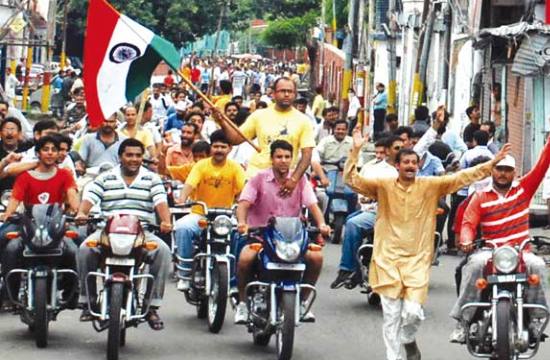
Last summer, as Kashmir rose to undo any future threat of economic blockade, traders seemed determined to regain control over the trade and open alternative routes for supplies. A year after, little has changed. HAMIDULLAH DAR reports on how the domination by Jammu traders can become a political arm twisting tool.
One year ago, when businessmen in Jammu strangulated Kashmir’s jugular vein – the Srinagar Jammu highway – to cut off essential supplies, Kashmir rose to demand the opening of an alternative route. Several weeks of protests and scores of deaths later, the Srinagar-Muzaffarabad route was opened for trade, but Jammu still controls majority of the trade in the state and sits at the gateway of essential supplies to Kashmir including medicine and fast moving consumer goods (FMCGs).
The economic blockade was not restricted to Kashmir valley alone, it was also clamped on Muslim majority areas of Jammu division like Doda, Poonch and Rajouri. Ladakh also felt its impact as the transit route of supplies to this region runs through Kashmir. In Jammu region two Kashmiri drivers were burnt alive and vehicles owned by Kashmiris were torched along with the goods to enforce the economic blockade. While as Hindus of Jammu region did everything to create a communal divide including setting ablaze Muslim houses (in Akhnoor area) and other property, in Kashmir mass uprising by a million people did not even touch a single Hindu pilgrim (on pilgrimage to Amarnath shrine) in the valley.
Although the agitation in Jammu mysteriously vanished overnight after inflicting much suffering to the people of Kashmir, Doda, Rajouri and Poonch, most of the Indian companies still maintain their Commission and Forwarding (C&F) facilities in Jammu despite opposition from Kashmir traders. Consumers in valley, which buy larger portion of the goods traded in J&K, depend on the goodwill of Jammu traders for supplies. And the reluctance to establish separate C&Fs in Kashmir is now attributed to the fragile security situation in Kashmir.
However, analysts in Kashmir maintain that after the agitation, C&F has acquired political dimension as Jammuites can use them for strangulating supplies and thus crushing agitations in future besides furthering their own interests.
The economic blockade had begun after the Amarnath land row in Kashmir following which the government rolled back its order of transfer of land to Shri Amarnath Shrine Board. Traders and business community in Jammu made the blockade a part of their counter- agitation that was formally announced by BJP state president Ashok Khajuria on June 22, 2008. Though initially there were some stray incidents of road blockade but as the agitation gained momentum, the attacks on Kashmiris became more virulent. It flared up the passions in Kashmir and people sought the reopening of Srinagar-Muzaffarabad road which resulted in death of scores of people including Peoples League chairman, Sheikh Abdul Aziz. In Kashmir, the blockade was seen as a blackmail that had deprived babies of milk and the ailing of life saving drugs.
“Economic blockade was an eye-opener for both Kashmiri consumers and Jammu businessmen. Kashmiris came to know how much dependant they have grown over the years on supplies that come through Jammu and that an economic blockade could even spell doom for them within weeks. Jammu business community realised that they are dependent on Kashmir for their economic well being,” opines Chairman Kashmir Chamber of Commerce and Industry (KCCI), Dr Mubeen Shah.
The stoppage of supplies to Kashmir valley by Jammu based traders had compelled Kashmiri traders to deal directly with companies and manufacturing industries outside state, bypassing the ‘belligerent’ Jammu.
This kicked off a formal face-off between the traders’ organisations of Kashmir and Jammu. The traders’ organisations including KCCI and Federation of Chamber of Commerce and Industry Kashmir (FCCIK) announced snapping of trade relations with their Jammu counterparts on September 13, 2008.
Traders said that the decision was largely driven by insistence of common people who called for snapping trade ties with Jammu even if it meant higher prices for certain goods. “The attitude of Jammu traders was in contrast with the traders organisations in Kashmir.















